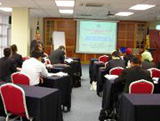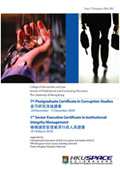Training Programs
Training programs for anti-corruption practitioners
Malaysia Anti-Corruption Academy (MACA)
 The Malaysia Anti-Corruption Academy (MACA), the first of its kind in the Asia-Pacific region, was established in December 2005 under the Malaysian Anti-Corruption Commission (MACC),formerly Anti-Corruption Agency (ACA).
The Malaysia Anti-Corruption Academy (MACA), the first of its kind in the Asia-Pacific region, was established in December 2005 under the Malaysian Anti-Corruption Commission (MACC),formerly Anti-Corruption Agency (ACA).
The training center aims to be the regional hub for anti-corruption capacity building, offering more than 50 courses on various fields, including investigation, prosecution, Intelligence, and prevention, for anti-corruption practitioners from around the world as well as officials of MACC and relevant government agencies of Malaysia.
- Accountability and Integrity in Public Sector Organisation Workshop (5 days)
- Management Code of Ethics (5 days)
- Executive Certificate Course for Strategic Management of Anti--Corruption Programme (10 days)
- Senior Executive Certificate Course for Strategic Management of Anti-Corruption Programme (5 days)
- Website: www.sprm.gov.my/index.php/en/maca
- Address: Malaysia Anti-Corruption Academy Persiaran Duta Off Jalan Duta, 50480, Kuala Lumpur, Malaysia
- Tel: +603-6209-2800
- Fax: +603--6201-6197
- E-mail: info.maca@sprm.gov.my
International Anti-Corruption Academy (IACA)
The International Anti-Corruption Academy (IACA) will be launched in September 2010 as the world"s first educational institution dedicated to fighting corruption. The Academy aims to build knowledge and skills for anti-corruption practitioners from all over the world, including policymakers in governments, the private sector and civil society, as well as professionals such as judges, investigators, prosecutors, police officers, regulators and academics.
The IACA is the outcome of the concerted efforts of the government of Austria, the United Nations Office on Drugs and Crime (UNODC) and the European Anti-Fraud Office (OLAF).
- Website: www.iaca.int
- Address: Munchendorferstrasse 2, 2361 Laxenburg, Austria
- Tel: +43 1 26060 4191
- Email: mail@iaca.int
Anti-Corruption Programs in Hong Kong University School of Professional and Continuing Education
 Hong Kong University School of Professional and Continuing Education (HKU SPACE) offers two anti-corruption programs: Postgraduate Certificate in Corruption Studies and Senior Executive Certificate in Institutional Integrity Management programs.
Hong Kong University School of Professional and Continuing Education (HKU SPACE) offers two anti-corruption programs: Postgraduate Certificate in Corruption Studies and Senior Executive Certificate in Institutional Integrity Management programs.
The Postgraduate Certificate in Corruption Studies programme provides academic and professional training in anti-corruption studies for professionals from around the world. Since its launch in 2003, the Postgraduate Certificate Program attracted more than 200 officials of anti-corruption authorities coming from 34 countries and regions.
It comprises six modules: Theories on Corruption, Corruption Legislation, Comparative Studies of Anti-corruption Structures and Strategies, Anti-Corruption Enforcement, Corruption Prevention and Community Education, and Integrated Group Project.
Supported by the International Association of Anti Corruption Authorities (IAACA), and Tiri (the governance-access-learning network), the program is part of the Public Integrity Education Network (PIEN), which is a network of more than twenty universities around the world with the common goal of promoting integrity education.
Senior Executive Certificate in Institutional Integrity Management program, which was launched in 2010, is developed to train future Certified Institutional Integrity Officer (CIIO).
This program aims to provide participants with both professional knowledge and skills as required for strengthening the institutional integrity profile of their organizations (either public or private) and hence enhance their capabilities to safeguard their organizations against corruption.
It consists of three integrated modules: Institutional Framework for Controlling Corruption; Corruption Prevention and Education; and Detection and Investigation of Corrupt Practices.
CoursesPostgraduate Certificate in Corruption Studies (3 weeks)
Senior Executive Certificate in Institutional Integrity Management (9 days)
- Website: hkuspace.hku.hk
- Address: The University of Hong Kong, Pokfulam, Hong Kong
- Tel: +852 2975 5685
- Fax: +852 2571 0630
- Email: carmen.chan@hkuspace.hku.hk
Center for Asian Integrity (CAI)
The Center for Asian Integrity was launched in August 2008 by the Office of the Ombudsman of the Philippines in partnership with the Institute of Ethics Governance and Law (IEGL), Griffiths University in Australia, and the University of the Philippines"s National College of Public Administration and Governance (NCPAG).
This center provides training programs for public officials and anti-corruption advocates on integrity and accountability building, and conducts research on combating corruption and building integrity systems.
Contact- Website: www.ombudsman.gov.ph
University of Passau-Lecture and Workshop on Economics of Corruption
Organized by the University of Passau, the Economics of Corruption course has attracted around 100 participants around the world annually. This international event continues to be offered on a pro bono basis. It is directed towards anti-corruption policymakers and practitioners, as well as graduate and post-graduate students and faculty in the social sciences.
This course is part of a comprehensive Master"s Program at the University of Passau, and consists of 5 guest trainings from selected experts, case studies, games and poster presentations, and a dinner presentation.
The Economics of Corruption 2016 (9-16 October. 2016)
Contact: Prof. Dr. Johann Graf Lambsdorff- Website: www.icgg.org
- Address: University of Passau, Innstrasse 27, D-94032 Passau, Germany
- Tel: +49 (0)851 509-2550
- Fax: +49(0)851-509-2552
- Email: Johann.GrafLambsdorff@uni-passau.de
